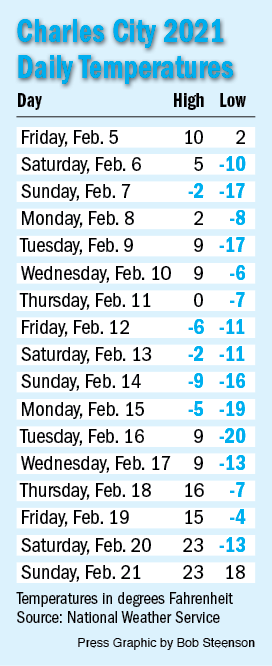Energy bills will see bump after cold February
By Bob Steenson, bsteenson@charlescitypress.com
More than two weeks of sub-zero temperatures in February will likely have a significant impact on utility bills, the area suppliers of natural gas have said.
MidAmerican Energy said in a statement last week that the average residential customer should see a March gas bill that’s $13 higher than February, as well as continued higher bills for several months as higher gas bills are spread out.
 Over the next year, residential customers can expect to see an average increase of $214 in their natural gas charge, or the equivalent of about $18 additional per month, compared to the previous five-year average cost.
Over the next year, residential customers can expect to see an average increase of $214 in their natural gas charge, or the equivalent of about $18 additional per month, compared to the previous five-year average cost.
The average annual residential gas bill over the past five years has been $566, MidAmerican said. A $214 increase on that is about a 38% increase.
The average commercial customer should see a March bill that has increased $95, the company said, and expect to pay an additional $1,182 or about $98 per month over the next year.
The five-year average annual commercial gas bill has been $2,233, MidAmerican said. A $1,182 increase is 53%.
A spokesperson for Alliant Energy said last week that natural gas bills for its customers would also increase, but the company had not yet determined how much.
The reasons for the extra charges are both an increase in the amount of natural gas used, as well as increases in the prices of natural gas brought on by increased demand as well as problems with the supply chain because of the cold.
In Charles City, the nighttime low temperature was below zero for 15 straight days in February, including 10 days when it was minus 10 or lower, and including five days when the daytime high stayed below zero.
Due to the extremely cold temperatures, from February 5-18, MidAmerican residential customers used 50% more natural gas than normal for that two-week period, a company spokesperson said.
A spokesman for the American Gas Association, which represents more than 200 local energy companies, said Feb. 14 and 15 set a record for the largest natural gas demand in U.S. history over a two-day period.
While natural gas utilities faced “unprecedented challenges” and “spot prices climbed in some regions due to spikes in demand, families and businesses that use natural gas were protected from higher prices by the careful planning of their utilities,” said Jake Rubin, a spokesman for the gas association.
Most natural gas utilities use long-term contracts to guarantee enough supply to meet demand and to lock-in affordable prices, he said, preventing price spikes that made residential utility bills run hundreds or thousands of dollars higher than normal in some parts of the country.
“MidAmerican supplies gas to its customers as a pass-through cost without a mark-up or profit,” the company said. “Unusually strong winter demand, combined with a sudden decrease in natural gas production in the Southern U.S., resulted in extreme market price jumps that substantially increased the costs that utilities, including MidAmerican, paid for the commodity.
“MidAmerican’s underground gas storage, liquified natural gas storage and advance purchase contracts that locked in prices prior to this month’s events, helped mitigate market price impacts to customers,” the company said.
“MidAmerican’s efforts helped shield customers from more than $400 million in costs that would have been incurred by making real-time purchases in the market during the extreme price spike,” the company said.
MidAmerican’s monthly bill separates natural gas and electricity costs, and electricity should not be affected like natural gas costs were, the company said.
Electricity bills will increase if usage increased due to electric heat or electrical space heaters, but otherwise MidAmerican “expects minimal impact to the electric component of customer bills.”
Mike Gehringer, MidAmerican’s vice president of customer operations, said the company is asking the Iowa Utilities Board to allow the company to spread out costs for increased gas prices over a longer period than usual.
“We understand that many are worried about an upcoming sticker shock for February heating, so we’re doing everything we can to lessen the financial burden on our customers,” Gehringer said.
The company advised customers to consider its “budget billing” option, which averages the annual fluctuations in natural gas and electricity prices and usage to have the same bill every month. Usage is evaluated periodically and the budget payment adjusted to stay on track.
Iowa Gov. Kim Reynolds announced Friday the availability of a precheck for the new Iowa Rent and Utility Assistance Program, which will begin accepting full applications in March.
Although not specifically tied to increased heating bills, the program will provide rent and utility assistance to Iowans who have been affected by COVID-19. The state was awarded $195 million for the program through the Consolidated Appropriations Act of 2021, which was passed by Congress in late 2020.
“At no fault of their own, many Iowans are struggling to pay their rent and utility bills as a result of lost income from the COVID-19 pandemic,” said Reynolds. “Last year, we were able to use $30 million in coronavirus relief funds to keep 14,000 Iowans in their homes. The Iowa Rent and Utility Assistance Program will help us do even more, providing substantial assistance to struggling Iowans who are facing eviction.”
Renters in need of assistance are encouraged to take the new eligibility precheck to determine if they meet the initial eligibility criteria, and if eligible, to sign-up to receive notification when the full application is available in March.
Full program details and the eligibility precheck are available at iowahousingrecovery.com.
MidAmerican also encouraged its Iowa customers who may qualify to apply for aid from the Low-Income Home Energy Assistance Program (LIHEAP).








Social Share